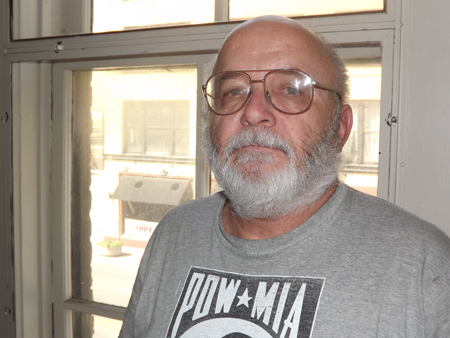The county’s Veterans Service Commission (VSC) denied 12 of the 437 veterans who applied for emergency financial aid during the past three months because of questions surrounding the applicants’ previous residency.
That’s 12 too many for Nick Haupricht, chairman of Remembrance Inc., a local group of six veterans that advocates for the refurbishing of war memorials.
“We’ve got veterans out there on the streets — that’s what burns me,” he said.
Haupricht attributes this to a section of the Ohio Revised Code written into law in the ’90s. Section 5901.08 requires veterans to prove that they have lived in the county in which they are seeking financial assistance for at least three months.
For example: If a man loses his home in Michigan, catches a bus to Toledo and winds up on the streets, in order to receive emergency cash from the Lucas County Veterans Service Commission (VSC), he’d need to either enroll in a local shelter’s housing program or sign a lease. And then wait for three months.
Or say a woman who served in Iraq has lived on and off Toledo’s streets for a while. If she has no proof that she’s lived somewhere in Lucas County then she cannot receive aid from Lucas County’s VSC.
The VSC rarely has to turn people away based on the three-month rule, said Jason Brown, deputy director of VSC. In 2011, the VSC fielded 1,961 requests for emergency financial assistance. Of the 59 requests denied because of residency issues, some were turned away merely because they failed to finish paperwork, Brown said.
Also, veterans new to Lucas County fall under the jurisdiction of their previous homes, and are thus eligible to receive aid from their home county’s commission. Likewise, if a veteran leaves Lucas County, the Lucas County VSC can continue to serve that individual for three months, Brown said.
But the rule is all too familiar for folks at Cherry Street Mission, where veterans comprise 15 percent of the homeless seeking shelter. Whether they’re coming in from out of state or have stayed off the grid for a while, many veterans who enter the mission’s doors have to play that three-month waiting game, said Dan Rogers, CEO and president of the mission.
After the shelter has served someone for 90 days, staff can report to the VSC for that individual to receive aid. But even for those who have lived in Lucas County for at least three months, digging up old leases for proof of residency can be daunting, Rogers said.
The law was instated to solve a “double, triple and even quadruple-dipping” problem, Brown said. The Veterans Service Commission had found that a number of low-income veterans were using up one county’s resources to his or her limits and moving on to the next, he said.
The Lucas County VSC has no limit on the amount of money given to each person who requests help, but one person can receive help up to three different times in one year, he said.
“So a lot of people are punished for the people who took advantage,” said Renee Palacios, director of the Family House. “That just puts another layer of bureaucracy in front of homeless people. Years ago our economy was way different — it’s time to move forward.”
With the new directive from the Lucas County Homelessness Board that presses the county shelter system to reduce the average length of stay to 30 days, the three-month rule regarding veterans becomes all the more challenging, Palacios said.
Tammy Holder, executive director of the Beach House Family Shelter, said she hasn’t seen barriers blocking impoverished veterans from getting the aid they need from the commission. About 6 percent of those who sought shelter at the Beach House Family Shelter last year were veterans, she said.
Sen. Edna Brown, who is on the State and Local Government and Veterans Affairs committee, wrote in a prepared statement that her office has communicated with the Ohio Department of Veterans Services and the Lucas County VSC regarding the rule.
Acknowledging that the rule was implicated to preclude a person from receiving assistance from multiple counties at once, she wrote that her office is researching options to determine if there are other ways for commissions to determine if a veteran in question is receiving service elsewhere.
Her office is comparing solutions that other states have made, she wrote.
“I understand that this rule makes it difficult for homeless veterans to receive financial assistance from the county commissions,” she wrote.
Haupricht and his crew have started a campaign to strike down the three-month residency law. They’ve contacted state senators and representatives and will pass out fliers during the Memorial Day parade.























